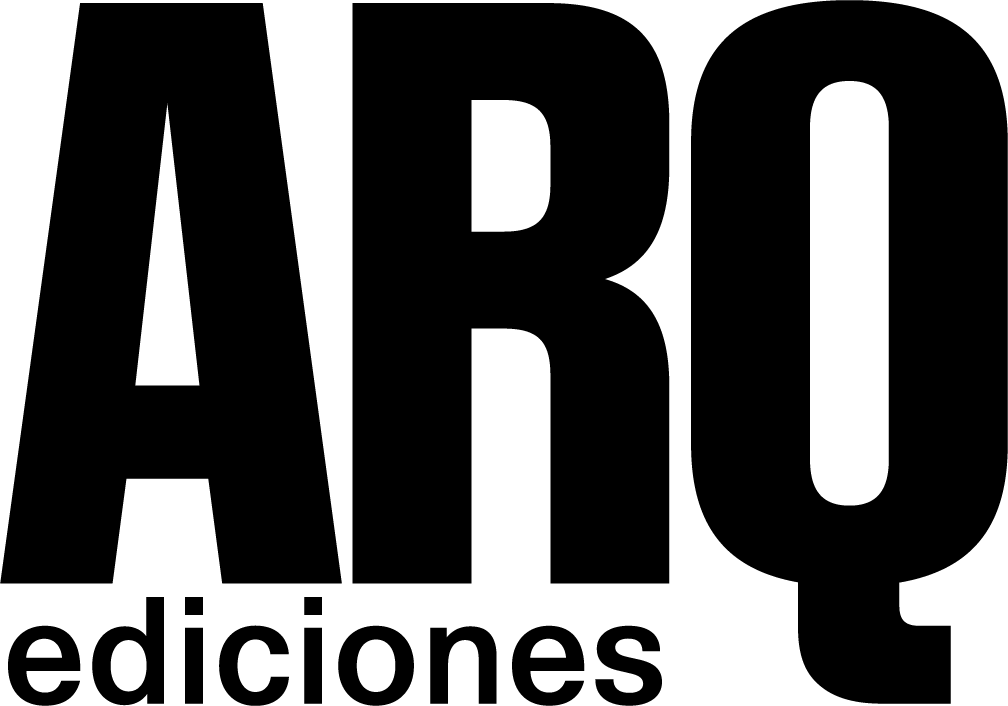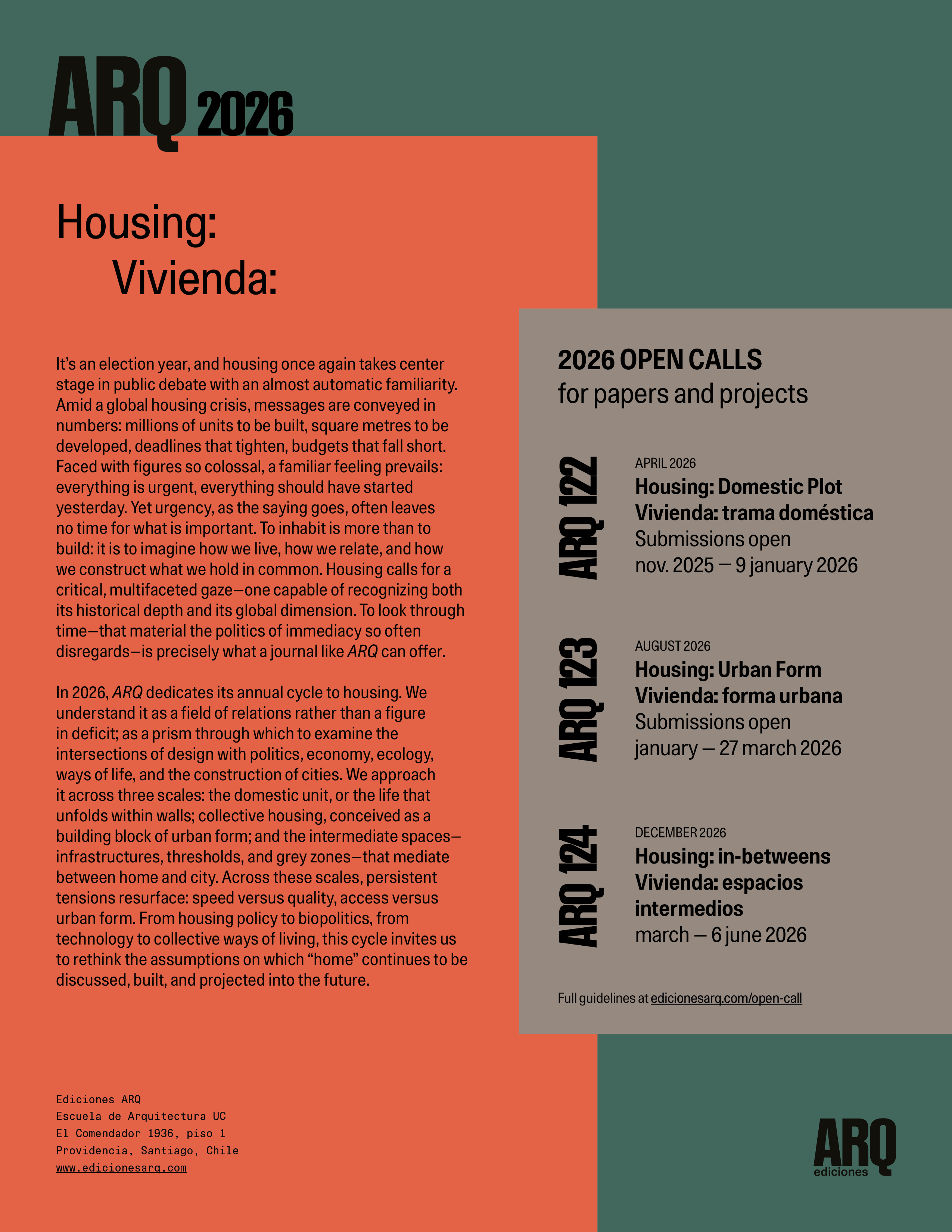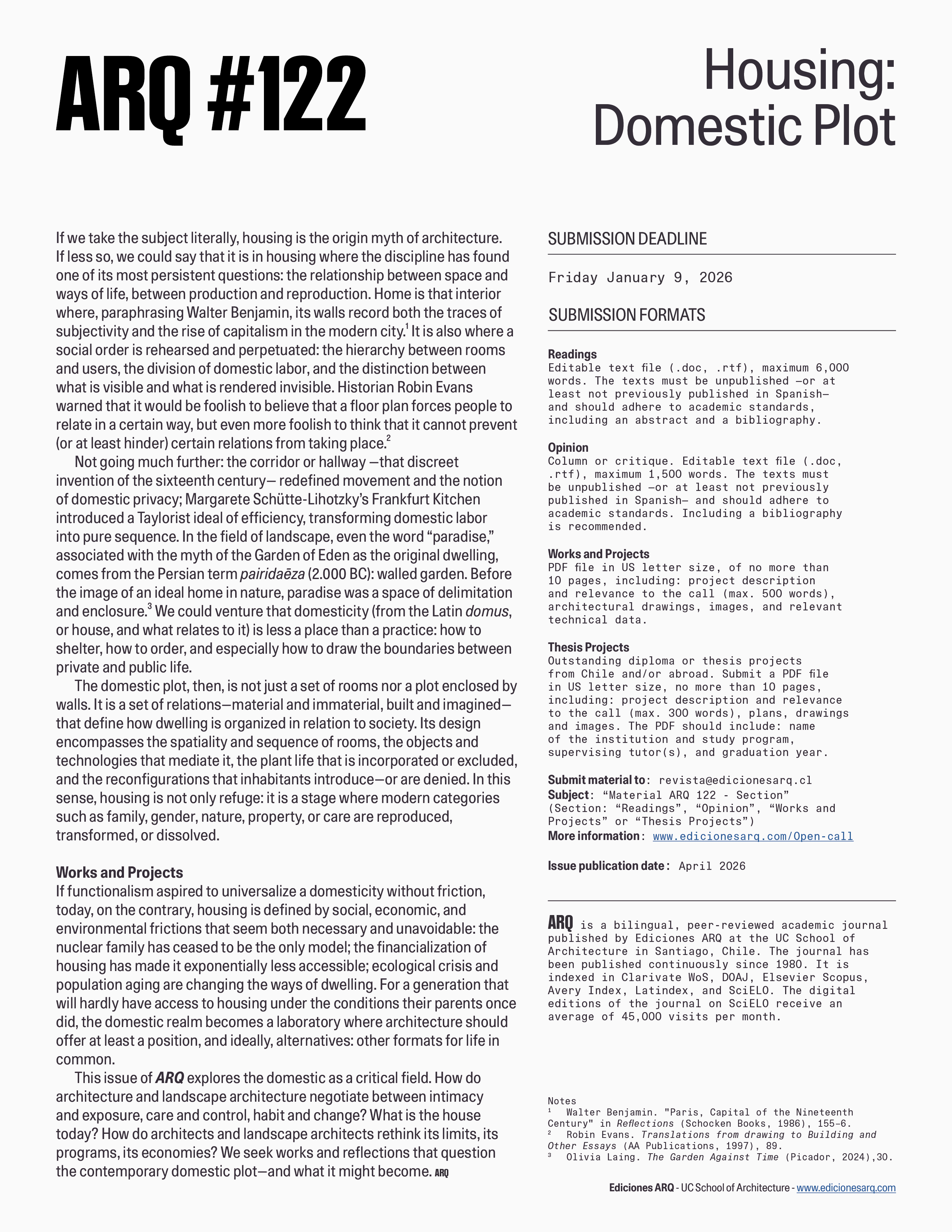ARQ is a peer-reviewed, open-access journal of architecture, landscape, and urban design. Issues are thematic and based on open calls.
︎︎︎ Editorial board
︎︎︎ Submission instructions
︎︎︎ Review procedures
︎︎︎ Peer reviewers and affiliations︎︎︎ Copyright and Licencing
︎︎︎ Ethics and handling of complaints
Open Calls
ARQ 2026 — Housing:
- ARQ no.122 (Apr. 2026)— Housing: Domestic Plot (OPEN until January 9, 2026)
- ARQ no.123 (Aug. 2026) — Housing: Urban Form (CLOSED)
- ARQ no.121 (Dec. 2026)— Housing: in-betweens (CLOSED)
Contact
Submit your proposals or queries to revista@edicionesarq.cl
Submission Instructions
ARQ journal welcomes submissions to be published both in its ‘Readings’ and ‘Works and Projects’ sections according to the themes defined for each issue. Submitted articles should be previously unpublished, or at least not have been published in Spanish. We suggest that authors maintain this condition for at least two months after the publication of the material in the journal.
ARQ does not charge any fees to publish articles or projects in the journal.
ARQ does not charge any fees to publish articles or projects in the journal.
- Readings
Texts submitted for publication in the ‘Readings’ section must be the result of a research process following academic standards, including footnotes, bibliographical references within the text (Chicago author-date) and the corresponding list of bibliographical references, ordered alphabetically by author. We suggest a range of 2,500 to 6,000 words in length for the main text. References should be formatted following the Chicago manual of Style, as detailed in the following link.
-
Works and Projects
Letter size .pdf file of max 10 pages which must include: project statement (500 words max.), floor plans, images and technical data. It is important that the material can provide an argument in relation to the specific theme of an issue. We favor the publication of material that is not limited to the representation of a finished work. Notes, sketches, diagrams, working models and construction records/images are part of the desired scope of contents for publication.
Peer Review Procedures
READINGSAll readings undergo a two-stage peer review process:
-
Initial editorial review (4 weeks)
After a call for papers closes, all texts received undergo a preliminary evaluation by the journal’s editorial team. During this stage, the managing editor checks whether the article meets the minimum requirements and, therefore, whether it proceeds to the peer-review process or is rejected without review. Articles rejected at this stage exhibit at least one of the following shortcomings: they are not related to the journal’s topic, they do not adhere to the required format, they exhibit significant language deficiencies, or they contain serious errors that could be conceptual, methodological, or pertaining to the cited literature.
We aim to notify of desk rejections within 6 weeks from the closing date of a call for submissions. - Double-Blind Peer Review (6 to 8 weeks)
Articles considered suitable for peer review in the initial evaluation are anonymized and sent to the General Editor, who, in turn, asigns them to two expert in their relevant disciplinary areas. In the journal, these areas include: architectural history and theory, criticism, landscape architecture, urban design, urban planning, mobility, heritage, among others. Both author and reviewer information is kept confidential throghout the review process and beyond. Reviewers are asked to provide a report on the quality and interest of the material, which is subsequently communicated to the authors. If approved, the articles become part of ARQ’s scheduled indexes. If an article is approved with substantial changes, the decision to include it in the issue will be made by the General Editor. In the event that two reviewers express conflicting views (ie. ‘approved without changes’ by one reviewer and ‘rejected’ by another) the article will be sent to a third reviewer.
We aim to send confirmation of approval or rejection along with the reviewer’s evaluation to the authors of a text within 12 weeks from the closing date of the call for submissions.
In the event of approval for publication, the requirements for submitting the final material for Readings can be downloaded here.
- Editorial board review (8 to 12 weeks)
All submissions received for the ‘Works and Projects’ section are reviewed by the journal’s editors and preselected based on their relevance to the theme of the call. The editorial board evaluates the preselected projects based on material received and convenes to decide their inclusion in the indexes for each issue of the journal.
In total, the evaluation process and the issuance of a confirmation of approval or rejection to the authors of the projects and works will take between 8 to 12 weeks from the closing date of the call for submissions.
In the event of approval for publication, the requirements for submitting the final material for the “Works and Projects” section can be downloaded here.
Peer Reviewers and Affiliations
Paula Aguirre (UC)
Pablo Alfaro (UAI)
Felipe Aravena (University of Manchester)
Eloy Bahamondes (UC)
Anahí Ballent (IESCT)
Umberto Bonomo (UC)
Tatiana Carbonell (ETH Zürich)
Armando Caroca (University of Manchester)
Gonzalo Carrasco (UC)
Alejandra Celedón (UDP)
Camila Cociña (International Institute for Environment and Development)
Pedro Correa (Columbia University)
Macarena Cortés (UC)
Alejandro Crispiani (UC)
Alejandro de Castro (Leibniz Institute of Ecological Urban and Regional Development)
José de Nordenflycht (Universidad de Playa Ancha)
Liliana de Simone (UC)
Lucía Galaretto (Columbia University)
Adrián Gorelik (Universidad Nacional de Quilmes)
Mariana Jochamowitz (PUCP)
Michelle Llona (PUCP)
Marcelo López-Dinardi (Texas A&M University)
Wiley Ludeña (PUCP)
Ana Mayoral (UCL)
José Manuel Monge (UCLA)
Daniel Opazo (Universidad de Chile)
Paula Orta (UC)
Josep Parcerisa (ETSAB)
José Parra (Universidad de Alicante)
Sol Pérez Martínez (ETH Zürich)
Fernando Portal (UDLA)
Francisco Quintana (UC; RCA)
Rayna Razmilic (UC)
Camila Reyes (Princeton University)
Nicole Rochette (UC)
Valentina Rozas-Krause (UAI)
Nicolás Stutzin (UDP)
Carolina Tobler (FADU Udelar)
Nicolás Valenzuela-Levi (UTFSM)
Claudio Vásquez (UC)
Lucas Vásquez (UC; UDD)
Elizabeth Wagemann (UDP)
Rafael Zamora (PUCP)
Francisco Vergara-Perucich (UDLA)
Pablo Alfaro (UAI)
Felipe Aravena (University of Manchester)
Eloy Bahamondes (UC)
Anahí Ballent (IESCT)
Umberto Bonomo (UC)
Tatiana Carbonell (ETH Zürich)
Armando Caroca (University of Manchester)
Gonzalo Carrasco (UC)
Alejandra Celedón (UDP)
Camila Cociña (International Institute for Environment and Development)
Pedro Correa (Columbia University)
Macarena Cortés (UC)
Alejandro Crispiani (UC)
Alejandro de Castro (Leibniz Institute of Ecological Urban and Regional Development)
José de Nordenflycht (Universidad de Playa Ancha)
Liliana de Simone (UC)
Lucía Galaretto (Columbia University)
Adrián Gorelik (Universidad Nacional de Quilmes)
Mariana Jochamowitz (PUCP)
Michelle Llona (PUCP)
Marcelo López-Dinardi (Texas A&M University)
Wiley Ludeña (PUCP)
Ana Mayoral (UCL)
José Manuel Monge (UCLA)
Daniel Opazo (Universidad de Chile)
Paula Orta (UC)
Josep Parcerisa (ETSAB)
José Parra (Universidad de Alicante)
Sol Pérez Martínez (ETH Zürich)
Fernando Portal (UDLA)
Francisco Quintana (UC; RCA)
Rayna Razmilic (UC)
Camila Reyes (Princeton University)
Nicole Rochette (UC)
Valentina Rozas-Krause (UAI)
Nicolás Stutzin (UDP)
Carolina Tobler (FADU Udelar)
Nicolás Valenzuela-Levi (UTFSM)
Claudio Vásquez (UC)
Lucas Vásquez (UC; UDD)
Elizabeth Wagemann (UDP)
Rafael Zamora (PUCP)
Francisco Vergara-Perucich (UDLA)
Copyright and Licencing
Copyright and Licencing
The submission of final texts and images implies that the authors allow ARQ to publish it in the corresponding issue (printed and digital) and in all communication material related to it (newsletters, press releases, social media and website updates), for a single time. The authors retain all rights on the material. Any re-issue of this material must be authorized by the authors.
The copyrights of texts featured in ARQ adhere to the Creative Commons license agreement and are published under a CC BY-NC 4.0 license. In general terms, authors retain full copyright and publishing rights, without restrictions, over the texts published in ARQ. To facilitate the circulation of this content, they authorize its reproduction, in total or partial, with due mention of sources and authorship.
Copyrights on images published in ARQ (photographs, plans, sketches) belong exclusively to their authors, who, case by case, reach an agreement with Ediciones ARQ for one-time use, in the corresponding issue and eventually in all communication material related to that issue (newsletters, press releases, social media and website updates). Only the respective authors can authorize the use in other media of images published in ARQ.
The signed articles are the responsibility of the authors and do not reflect the opinions of Ediciones ARQ nor Pontificia Universidad Católica de Chile.
Ethics oversight and handling of complaints
The copyrights of texts featured in ARQ adhere to the Creative Commons license agreement and are published under a CC BY-NC 4.0 license. In general terms, authors retain full copyright and publishing rights, without restrictions, over the texts published in ARQ. To facilitate the circulation of this content, they authorize its reproduction, in total or partial, with due mention of sources and authorship.
Copyrights on images published in ARQ (photographs, plans, sketches) belong exclusively to their authors, who, case by case, reach an agreement with Ediciones ARQ for one-time use, in the corresponding issue and eventually in all communication material related to that issue (newsletters, press releases, social media and website updates). Only the respective authors can authorize the use in other media of images published in ARQ.
The signed articles are the responsibility of the authors and do not reflect the opinions of Ediciones ARQ nor Pontificia Universidad Católica de Chile.
Ethics oversight and handling of complaints
ARQ adheres to COPE’s Core Practices on publication ethics. Upon acceptance of an article or a project in the journal, authors are asked to sign an ethics declaration stating that:
1) They are the authors of the material submitted and have righfully identified all parties involved in the production of material for their submission.
2) During the development of the submission they have not benefited from any forms of unpaid labor.
3) The inclusion of texts and ideas from third parties is correctly cited and referenced.
4) They have obtain the necessary reproduction permissions from authors of any visual material (images, photographs, graphs, etc.) that is not their own.
Notwithstanding the above, any allegations of research misconduct in published papers will be investigated by the General Editor and will be handled according to COPE’s post-publication guidelines. If concerns or allegations are proven right, the editor will aim to reach a solution based on an agreement with all the authors involved. This could include: adding a note or ammending the open-access digital version (pdf and html) of the original article published in SciELO. On occassions, a note could also be included in the colophon of the following printed edition of the journal.
If plagiarism is investigated and confirmed, the General Editor reserves the right to remove the article (PDF and HTML) from the SciELO open access digital library, stating the reasons for doing so in an editorial note in the corresponding and the following issue of the journal.
1) They are the authors of the material submitted and have righfully identified all parties involved in the production of material for their submission.
2) During the development of the submission they have not benefited from any forms of unpaid labor.
3) The inclusion of texts and ideas from third parties is correctly cited and referenced.
4) They have obtain the necessary reproduction permissions from authors of any visual material (images, photographs, graphs, etc.) that is not their own.
Notwithstanding the above, any allegations of research misconduct in published papers will be investigated by the General Editor and will be handled according to COPE’s post-publication guidelines. If concerns or allegations are proven right, the editor will aim to reach a solution based on an agreement with all the authors involved. This could include: adding a note or ammending the open-access digital version (pdf and html) of the original article published in SciELO. On occassions, a note could also be included in the colophon of the following printed edition of the journal.
If plagiarism is investigated and confirmed, the General Editor reserves the right to remove the article (PDF and HTML) from the SciELO open access digital library, stating the reasons for doing so in an editorial note in the corresponding and the following issue of the journal.
Delays in publishing
ARQ has been published regularly, three times a year without gaps since 1999. In the event of an unprecedented delay in the announced date of publication, authors will be notified and allowed to withdraw their manuscript from the journal if they wish.
Delays in publishing
ARQ has been published regularly, three times a year without gaps since 1999. In the event of an unprecedented delay in the announced date of publication, authors will be notified and allowed to withdraw their manuscript from the journal if they wish.
ARQ has been published regularly, three times a year without gaps since 1999. In the event of an unprecedented delay in the announced date of publication, authors will be notified and allowed to withdraw their manuscript from the journal if they wish.


